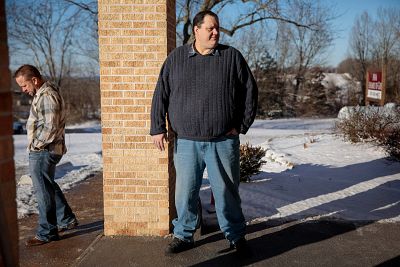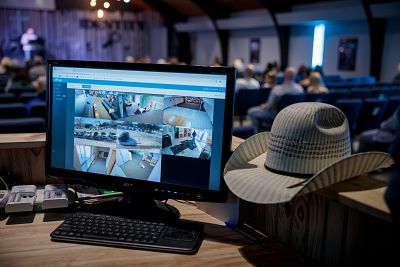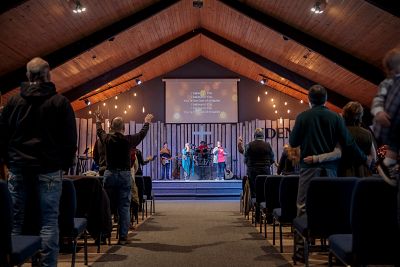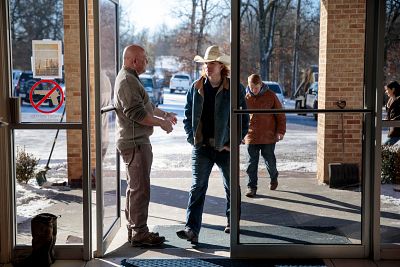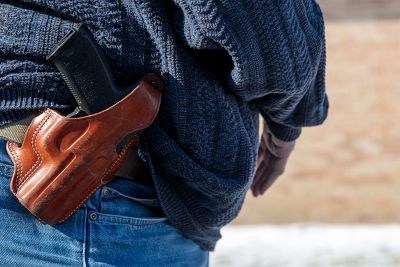"Fifty years ago, you could say no guns should be allowed in church, but times have changed," said a police chief who runs a volunteer church security team.
When Chris Crews prepares for church on Sunday mornings, he follows a routine. He rises early. He puts on his church clothes, a button-down shirt paired with blue jeans or khakis. Then, before leaving the house with his wife and two children, he straps a firearm — a 9 mm or a .45 — to his right hip.
"I don't leave home without a gun," Crews said. "It's kind of like the old American Express card ads: I just won't leave home without it."
Crews, 47, is part of the security team at Ava Assembly of God, a Pentecostal church of 300 members in Ava, Missouri. The church has no paid security guards. Instead, it counts on a team of 18 church members to keep fellow congregants safe. None of the security team members are paid and all carry handguns.
Ava Assembly of God launched the security team 18 months ago after the church's pastor, Buddy Boyd, received threats related to a domestic dispute involving members of the community.
In response, and amid rising fears of mass shootings in general, a congregant suggested forming a security team. Boyd quickly agreed.
"Times have changed," Boyd said. "The No. 1 concern is to protect our parishioners."
The volunteer security team at Ava Assembly of God is one of hundreds of such teams created in recent years by churches and synagogues to keep followers safe. According to several security companies and nonprofits that specialize in providing safety training to religious institutions, the growing number of the teams coincides with a string of high-profile attacks that have shown the vulnerability of houses of worship.
Carl Chinn, founder of the Faith Based Security Network, a nonprofit that offers safety guidance to faith communities, said he is aware of more than 1,000 volunteer-run security teams in houses of worship in the U.S. Two hundred of them, in 34 states, have registered with his network in the past 11 months. The majority have armed members.
Many of the teams were formed in direct response to deadly attacks at houses of worship, like the 2015 shooting at an Emanuel AME Church in Charleston, South Carolina, that killed nine; the 2017 shooting at the Sutherland Springs First Baptist Church in Texas that killed 26, including an unborn child; and the October shooting at the Tree of Life Synagogue in Pittsburgh that killed 12.
"There's always a surge of interest in forming a team or enhancing security right after an attack," Chinn said.
Most states allow concealed firearms in houses of worship, though many, including Missouri, where Ava Assembly of God is, require congregants to receive advanced permission from religious leaders, according to the National Conference of State Legislatures.
Since 2013, at least seven states have loosened restrictions on bringing guns into houses of worship, said Allison Anderman, managing attorney for the Giffords Center to Prevent Gun Violence, which advocates gun control and opposes guns in religious settings. In South Dakota, for example, parishioners can carry guns into houses of worship, even when they are on school campuses, where guns ordinarily are not allowed. And just last week, Virginia's state Senate passed a bill that would enable parishioners to legally bring guns into houses of worship.
Legality aside, guns are still not welcome in many churches. Both the Church of Jesus Christ of Latter-day Saintsand theUnited Methodist Churchhave issued statements deeming guns inappropriate for houses of worship, and the leaders of multiple Catholic archdioceses, from St. Louis to Atlanta, have spoken out against guns in their churches.
Gun control advocates have argued against weapons in houses of worship on the grounds that armed volunteers can cause confusion for law enforcement responding to reports of a shooting. And then there are the unintentional shootings that go along with guns, such as the man who accidentally shot himself and his wife in a Tennessee church in 2017 during a conversation about church shootings.
Chinn says there is evidence that church security teams can save lives, noting a 2007 incident in which Jeanne Assam, a former police officer and volunteer security team member, shot an armed intruder at a church in Colorado Springs, Colorado, who had killed two teenagers in the parking lot.
"People have come to recognize they can't just rely on calling 911 during an attack as a security plan," Chinn said. "They know they need to do something more."
'Shootings happen everywhere'
Like many of the members of the Ava Assembly of God security team, Crews does not have a background in law enforcement. He worked for 20 years as a satellite engineer in Los Angeles before relocating to Missouri in 2015. He decided to join the security team when it formed in 2017 after growing concerned about the mass shootings he read about in the headlines.
"You can't just go to a church and be inside the four walls and think what's outside can't come in here and can't hurt you," Crews said.
"Most of us are average Joe guys who hunt and fish and want to look out for others," he added. "We have administrators, farmers, school teachers on our security team."
The men — there are no women on the squad — work in teams of three each Sunday morning, adhering to a schedule that is emailed out every six weeks. Two men are stationed near the church's main entrance, doubling as greeters who shake hands as congregants enter. A third stands at the front of the church, near the pastor. On Wednesday nights, an armed volunteer is on site for teen and adult prayer groups.
"Fifty years ago, you could say no guns should be allowed in church, but times have changed," said Trampus Taylor, 49, the police chief in Sparta, Missouri, who started the Ava Assembly of God security team. "Shootings happen everywhere."
Boyd, the pastor at Ava Assembly of God, said volunteer security teams make economic sense for churches like his, which can't afford to hire professional security guards or off-duty police officers.
"Without volunteers, it would be difficult in our setting to be able to afford the type of security we have every week," Boyd said. "We are very well covered, and it brings us great peace."
'Churches are sitting ducks'
The Ava Assembly of God security team does regular drills, including tactical gun training sessions overseen by Taylor, a certified law enforcement instructor for Missouri.
Next month, the team will take part in simulation training overseen by Ozark Shoot, a security group that specializes in training church security teams. The company charges churches $400 to $1,000 for simulation sessions, which use real Glocks modified with lasers, to demonstrate how to confront an active shooter and aim accurately under pressure.
Michael Deans, who has been in law enforcement for 48 years, including 10 years at the Houston Police Department, started Ozark Shoot in 2017 because he saw a growing need for churches to address charged situations that could result in gunfire.
"The public would be amazed at what goes on behind the scenes in churches — anything from domestic situations involving married couples to stalking pastors to possible kidnapping of kids in custody cases," he said.
Jimmy Meeks, a retired police officer and a minister, started his security training company, Sheepdog Seminars, in 2009 after observing a similar need.
"If your church can afford to hire a professional security team or professional guards, by all means you should do so," said Meeks, whose company offers seminars that analyze a church's security, particularly at its entrances and parking lots. "But many churches can barely afford to pay the electric bill. They have to take these matters into their own hands."
Meeks acknowledged that the idea of mixing guns with God is disconcerting to some. But, he said, those who see no reason for guns in churches in 2019 are in denial.
"Churches are sitting ducks," Meeks said, noting that houses of worship tend to have multiple entrances and open-door policies that strive to accept everyone, including the emotionally unstable.
'A wake-up call'
The decision to allow congregants to carry weapons can be fraught. At Congregation Beth Yeshurun in Houston, the largest conservative synagogue in the United States, the congregation debated the issue for years, said Jerrad Bloome, the synagogue's president. Some were concerned that if women brought guns in their purses to services, children could reach for them.
Bloome was torn, saying he thought "guns are more likely to cause a problem than to save you." But after the deadly shooting at Pittsburgh's Tree of Life Synagogue in October, he said he better understood the case for armed congregants.
Beth Yeshurun ultimately decided not to formally encourage or forbid members from bringing firearms to services. Bloome is aware of some congregants who arm themselves with the aim of protecting others. The synagogue, which has 1,800 families as members, employs a team of professional armed security officers as well.
"I think Pittsburgh for the Jewish community was a wake-up call," Bloome said. "It's something we knew could happen, but people mostly thought: 'It's a place of worship, it can't happen here.' Now we know otherwise."
'Protect the flock'
Pastor Frank Pomeroy's 14-year-old daughter was among the victims in the 2017 shooting in Sutherland Springs, Texas.
Pomeroy said he had felt safe in church because he carried a gun and knew several church members who did as well. He believed he and other armed congregants would be able to defend the church in the event of a shooting. But because there was no formal schedule for armed congregants to follow, no one who traditionally brought a gun to church — including Pomeroy — was in attendance the day of the shooting.
"We thought we were prepared," Pomeroy said, "but we weren't."
Since the shooting, the church has invested in cameras and radios and also implemented a carefully choreographed schedule of volunteers who carry guns both openly and concealed during Sunday services.
"There's no scripture that shows me that we need to keep weapons out of the church," Pomeroy said. "There is scripture that says we are supposed to protect the flock."












